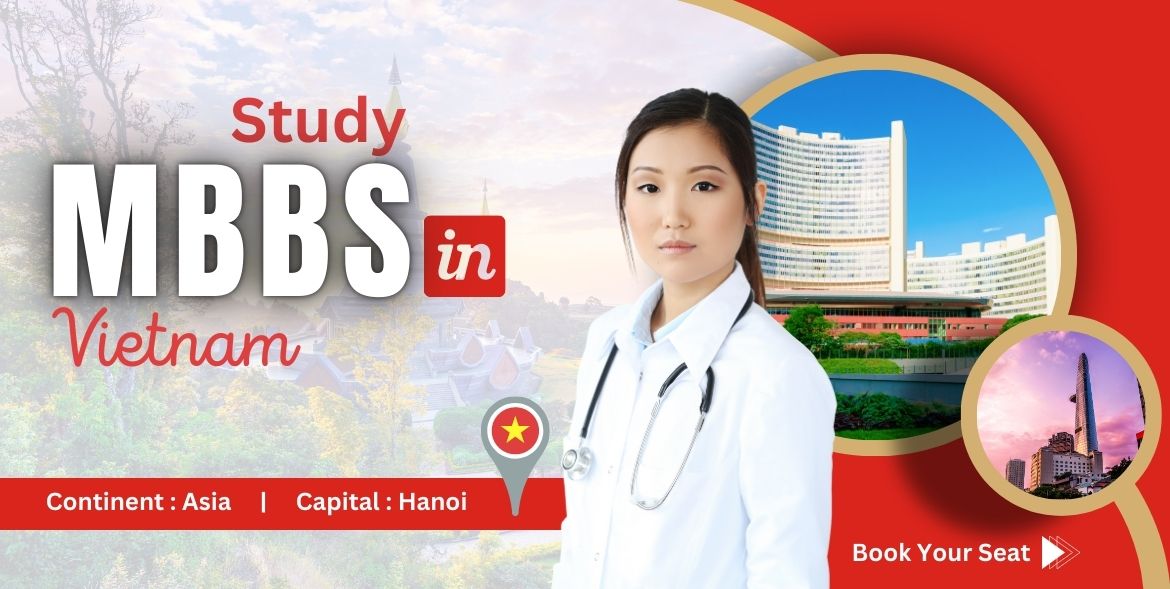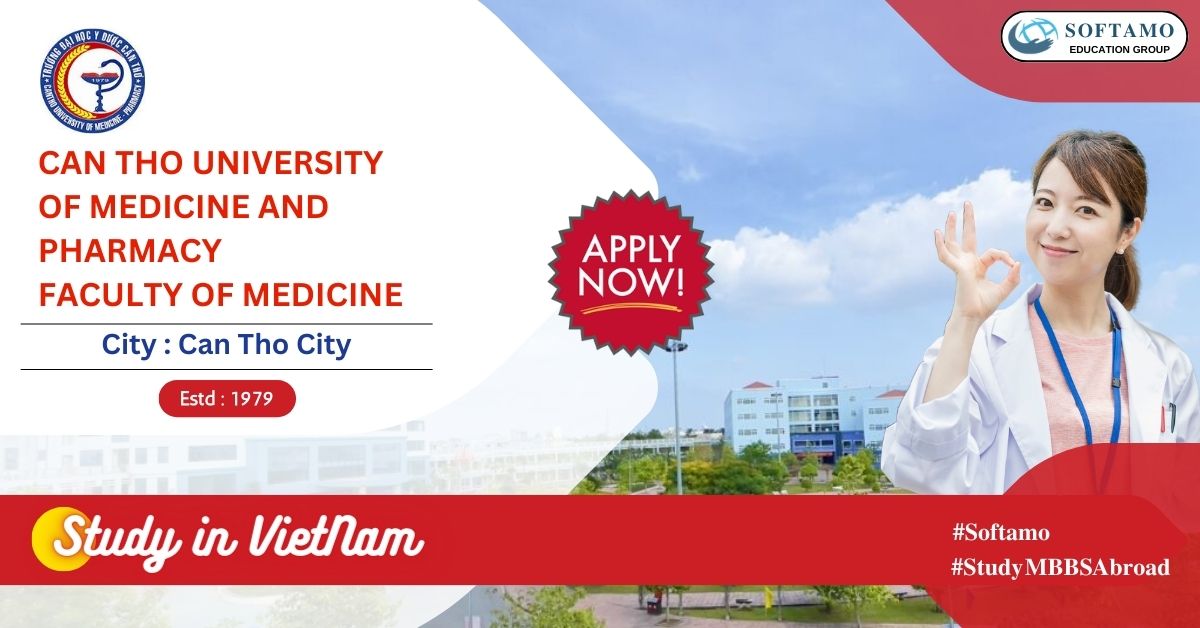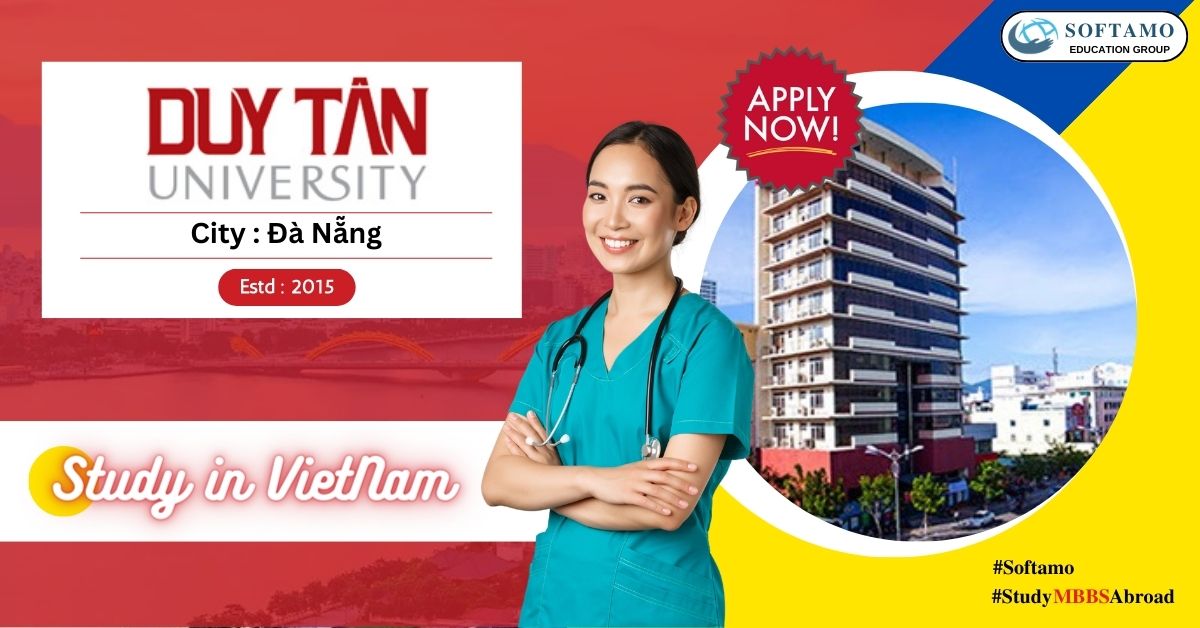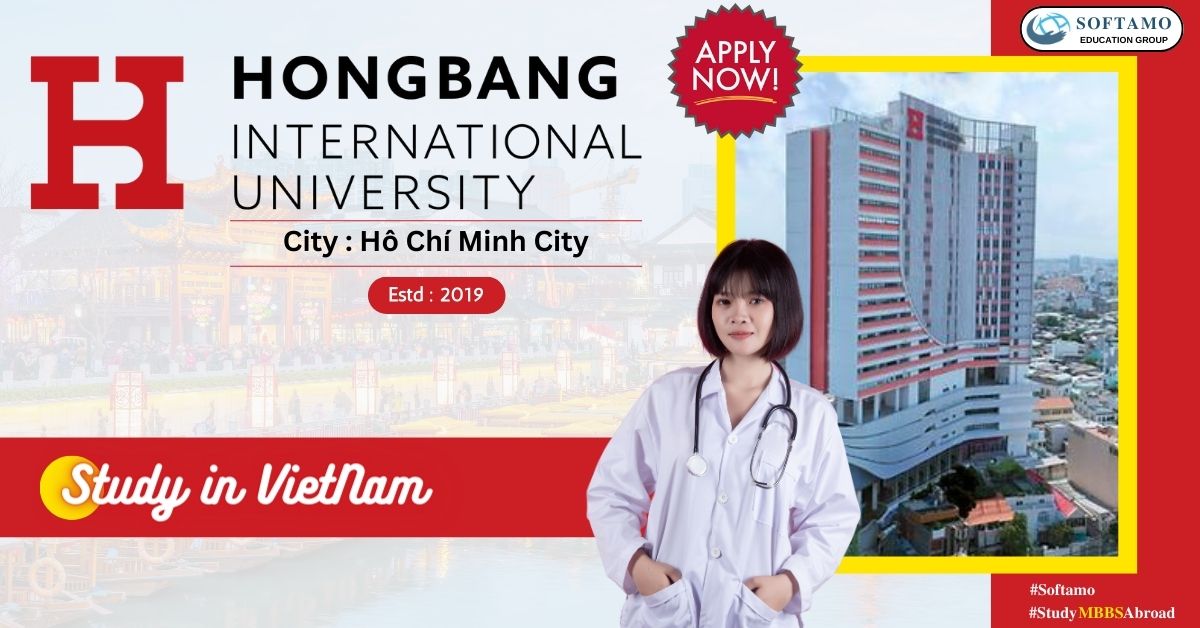
Introduction To MBBS IN Vietnam
Vietnam, officially named the Socialist Republic of Vietnam (SRV), is located in Southeast Asia and covers an area of 331,212 square kilometres with a population of 99 million individuals, ranking it as the fifteenth-most populous nation globally. It shares borders with China to the north and Laos and Cambodia to the west, with maritime borders with Thailand, the Philippines, Indonesia, and Malaysia. The largest city in Vietnam is Ho Chi Minh City, previously known as Saigon, while its capital city is Hanoi.
Dating back to the Paleolithic age, Vietnam has a rich history, with the first states established in the Red River Delta during the first millennium BC. Northern and Central Vietnam came under Chinese control during the Han dynasty from 111 BC until the emergence of the first Vietnamese dynasty in 939. The successive dynasties were influenced by Chinese Confucianism and Buddhism and expanded southward, conquering Champa in the process. The Nguyễn dynasty surrendered to France in 1883, and after the August Revolution in 1945, the nationalist coalition Viet Minh, led by communist revolutionary Ho Chi Minh, declared Vietnam’s independence.
Vietnam was engaged in prolonged warfare during the 20th century, starting with the First Indochina War against France, which Vietnam won in 1954, leading to the division of the country into two parts. The Vietnam War then started between the communist North, supported by the Soviet Union and China, and the anti-communist South, supported by the United States. In 1975, North Vietnam emerged as the victor and reunified the country as a unitary socialist state under the Communist Party of Vietnam. Despite facing several challenges such as an ineffective planned economy, a trade embargo by the West, and wars with Cambodia and China, the Communist Party of Vietnam initiated economic and political reforms similar to those of China in 1986, which helped transform the country into a market-oriented economy and facilitated its reintegration into the global economy and politics.
Vietnam is currently classified as a developing country with a lower-middle-income economy, yet it is one of the fastest-growing economies of the 21st century. It is predicted to have a GDP that rivals that of developed nations by 2050. Vietnam’s human rights record is poor, with a high level of corruption and censorship, ranking among the lowest in international measurements of civil liberties, freedom of the press, and freedom of religion and ethnic minorities. Despite this, Vietnam is a member of several international and intergovernmental institutions, including the ASEAN, APEC, CPTPP, Non-Aligned Movement, OIF, and WTO, and has served on the United Nations Security Council twice.
Quick Contact
Why MBBS in Vietnam for Indian Students?
MBBS in Vietnam Overview
Advantages of Studying MBBS in Vietnam for Indian Students
Cost of Studying for MBBS in Vietnam for Indian Students
Tuition Fees: The cost of studying MBBS in Vietnam for Indian students is relatively affordable compared to many other countries. The average tuition fee for studying MBBS in Vietnam ranges from $6,000 to $12,000 per year. However, this cost may vary depending on the university and the program selected by the student.
Accommodation Expenses: The cost of accommodation is relatively cheaper in Vietnam as compared to other countries. Students can choose from various options such as university dormitories, rented apartments, or shared accommodation. The average cost of accommodation in Vietnam ranges from $100 to $400 per month, depending on the type of accommodation.
Food Expenses: The cost of food in Vietnam is relatively cheaper compared to many other countries. Students can choose from a variety of cuisines ranging from traditional Vietnamese food to international dishes. The average cost of food in Vietnam ranges from $50 to $100 per month, depending on the student’s preferences and dietary requirements.
Transportation Expenses: The cost of transportation is also relatively cheaper in Vietnam. Students can use public transport such as buses, taxis, and motorbikes to travel around the city. The average cost of transportation in Vietnam ranges from $20 to $50 per month, depending on the distance traveled and the mode of transportation used.
Other Expenses: Students may also incur additional expenses such as medical insurance, visa fees, and other miscellaneous expenses. The average cost of these expenses in Vietnam ranges from $100 to $200 per year.
Scholarships: Various universities in Vietnam offer scholarships to international students, including Indian students, based on academic merit and financial need. Students can also explore various scholarship programs offered by the Indian government to study abroad.
Top Medical Universities in Vietnam for Indian Students
| University Name | Medium of Instruction | Course Duration (years) | Internship Duration (months) |
|---|---|---|---|
| Vietnam National University, Hanoi | English | 6 | 12 |
| University of Medicine and Pharmacy, Ho Chi Minh City | English | 6 | 12 |
| Hue University of Medicine and Pharmacy | English | 6 | 12 |
| Hanoi Medical University | English | 6 | 12 |
| Hong Bang International University | English | 6 | 12 |
| Can Tho University of Medicine and Pharmacy | English | 6 | 12 |
| Da Nang University of Medical Technology and Pharmacy | English | 6 | 12 |
| Duy Tan University | English | 6 | 12 |
| Pham Ngoc Thach University of Medicine | English | 6 | 12 |
| Thai Binh University of Medicine and Pharmacy | English | 6 | 12 |
| Hai Phong University of Medicine and Pharmacy | English | 6 | 12 |
| Vinh Medical University | English | 6 | 12 |
Note: The information provided in this table is subject to change and students are advised to confirm with the respective universities before applying.
Eligibility Criteria to MBBS in Vietnam for Indian Students
Admission Procedure for MBBS in Vietnam for Indian Students
Documents Required for MBBS in Vietnam for Indian Students
Syllabus of MBBS in Vietnam for Indian Students
| Year | Subjects |
|---|---|
| First Year | Anatomy, Biochemistry, Physiology, Behavioral Sciences, Vietnamese Language |
| Second Year | Pathology, Microbiology, Pharmacology, Immunology, Vietnamese Language |
| Third Year | Internal Medicine, Surgery, Obstetrics and Gynecology, Pediatrics, Vietnamese Language |
| Fourth Year | Internal Medicine, Surgery, Obstetrics and Gynecology, Pediatrics, Community Medicine, Vietnamese Language |
| Fifth Year | Internal Medicine, Surgery, Obstetrics and Gynecology, Pediatrics, Community Medicine, Vietnamese Language |
| Sixth Year | Internship and Clinical Rotations in Internal Medicine, Surgery, Obstetrics and Gynecology, Pediatrics, Community Medicine, Vietnamese Language |
MBBS in Vietnam vs MBBS in India
| Feature | MBBS in Vietnam | MBBS in India |
|---|---|---|
| Duration of course | 6 years | 5.5 years |
| Eligibility Criteria | Completion of 12th grade | Completion of 12th grade |
| Entrance Exam | Not required | NEET |
| Language of instruction | English | English, Hindi, Regional languages |
| Cost of education | Relatively low | Relatively high |
| Quality of education | Good | Varies depending on the institution |
| Recognition | Recognized by WHO and MCI | Recognized by MCI |
| Internship duration | 1 year | 1 year |
| Job opportunities | Limited for international students | Plentiful |
| Accommodation | Affordable | Affordable, but varies |
| Culture and lifestyle | Different from India | Familiar to Indian students |
MBBS in Vietnam and MBBS in India are both popular options for students looking to pursue medical studies. While the two countries offer similar programs, there are some differences between them in terms of duration, eligibility criteria, entrance exams, language of instruction, cost of education, quality of education, recognition, internship duration, job opportunities, accommodation, culture and lifestyle.
One of the major differences between MBBS in Vietnam and MBBS in India is the duration of the course. MBBS in Vietnam is a six-year program, while in India it takes 5.5 years to complete the course. Another difference is the eligibility criteria. Both programs require completion of 12th grade, but in Vietnam, there is no entrance exam requirement, whereas in India, students need to clear the NEET exam.
The language of instruction is another factor to consider when choosing between MBBS in Vietnam and MBBS in India. In Vietnam, the medium of instruction is English, while in India it can be in English, Hindi or regional languages. This may be a significant factor for international students who are not fluent in the local language.
The cost of education is also a crucial factor when choosing between MBBS in Vietnam and MBBS in India. MBBS in Vietnam is relatively low-cost compared to MBBS in India, which can be relatively expensive. However, the quality of education is good in both countries, with some variation depending on the institution.
Recognition is an essential factor when considering MBBS in Vietnam or MBBS in India. MBBS in Vietnam is recognized by the World Health Organization (WHO) and the Medical Council of India (MCI), while MBBS in India is recognized by the MCI.
Internship duration is another important factor to consider. Both MBBS in Vietnam and MBBS in India require a one-year internship program. However, job opportunities after completing the course may differ, with limited opportunities for international students in Vietnam compared to the plentiful options available in India.
Accommodation is another important factor to consider when choosing between MBBS in Vietnam and MBBS in India. Accommodation in Vietnam is generally affordable, while in India, the cost of accommodation may vary depending on the city and institution.
Lastly, culture and lifestyle may also be an important factor for students to consider when choosing between MBBS in Vietnam and MBBS in India. Vietnam’s culture and lifestyle are different from India’s, which may be a significant factor for some students. In contrast, Indian students may find the culture and lifestyle of India to be more familiar.
In conclusion, while both MBBS in Vietnam and MBBS in India offer medical programs, there are differences between them in terms of duration, eligibility criteria, entrance exams, language of instruction, cost of education, quality of education, recognition, internship duration, job opportunities, accommodation, and culture and lifestyle. Students must weigh these factors carefully before deciding which program is right for them. Ultimately, the choice between MBBS in Vietnam and MBBS in India will depend on individual circumstances, preferences, and goals.
Hostel and Accommodation Available in Vietnam for Indian Students
Why Study MBBS in Vietnam for Indian Students?
Affordable Tuition Fees: One of the main reasons why Indian students should consider studying MBBS in Vietnam is the affordable tuition fees. The cost of studying medicine in Vietnam is significantly lower than other popular destinations like the United States, the United Kingdom, or Australia. The tuition fees for MBBS programs in Vietnam can range from 7,000 to 20,000 USD per year, which is much cheaper than many other countries.
High-Quality Education: The medical universities in Vietnam are recognized by the World Health Organization (WHO), the Medical Council of India (MCI), and other international medical organizations. The education system in Vietnam is rigorous, and the curriculum is designed to provide students with a comprehensive understanding of the medical field. The faculties of medicine in Vietnam are equipped with state-of-the-art facilities and are staffed by highly qualified and experienced professors and lecturers.
English-Taught Programs: Most medical universities in Vietnam offer English-taught programs, which is an added advantage for Indian students who may not be fluent in Vietnamese. English is widely spoken in Vietnam, and most of the medical faculties have English-speaking professors and lecturers. This makes it easier for Indian students to understand the lectures and communicate with their peers and professors.
Diverse Cultural Experience: Vietnam is a diverse and culturally rich country, and studying in Vietnam can provide Indian students with a unique and enriching experience. The country has a rich history, fascinating culture, and a diverse cuisine that can be explored during free time. Studying in Vietnam can also expose Indian students to different perspectives and ways of thinking, which can broaden their horizons.
International Exposure: Studying MBBS in Vietnam can provide Indian students with international exposure and opportunities. The medical universities in Vietnam have partnerships with other universities around the world, and students can participate in international exchange programs. This can help Indian students gain valuable international experience, expand their network, and enhance their career prospects.
Better Job Opportunities: After completing their MBBS degree in Vietnam, Indian students can apply for jobs in Vietnam, India, or other countries. The demand for medical professionals is high in Vietnam, and Indian students can find job opportunities in both public and private healthcare sectors. The experience of studying and working in a foreign country can also make Indian students more attractive to employers.
Easy Visa Process: The visa process for Indian students who wish to study MBBS in Vietnam is straightforward and hassle-free. Indian students can apply for a student visa online or through the Vietnamese embassy in India. The visa application process is simple, and the approval rate is high.
Low Cost of Living: The cost of living in Vietnam is relatively low compared to other popular study destinations. Indian students can find affordable accommodation, food, and transportation. The cost of living in Vietnam is much lower than in the United States, the United Kingdom, or Australia.
Safe and Friendly Environment: Vietnam is a safe and friendly country, and Indian students can feel secure and comfortable while studying in Vietnam. The crime rate in Vietnam is low, and the locals are hospitable and welcoming to foreigners. Indian students can make new friends and enjoy their time in Vietnam while pursuing their MBBS degree.
Growing Healthcare Industry: The healthcare industry in Vietnam is growing rapidly, and there is a high demand for medical professionals. The Vietnamese government has invested heavily in the healthcare sector, and there are many opportunities for Indian students to work in hospitals, clinics, and research institutions. The healthcare industry in Vietnam is expected to grow even further in the coming years, which can provide Indian students with exciting career prospects.
Benefits of Studying MBBS in Vietnam for Indian Students
FAQs
What are the eligibility criteria for studying MBBS in Vietnam?
To be eligible for studying MBBS in Vietnam, Indian students must have completed their 10+2 with Physics, Chemistry, and Biology as core subjects. The minimum qualifying percentage is usually 50% for general category students and 40% for reserved category students.
Is the MBBS degree from Vietnam recognized in India?
Yes, the MBBS degree from Vietnam is recognized in India by the Medical Council of India (MCI). However, students must clear the MCI screening test or FMGE (Foreign Medical Graduate Examination) after completing their MBBS in Vietnam to practice medicine in India.
What is the duration of the MBBS course in Vietnam?
The MBBS course in Vietnam has a duration of 6 years, including 5 years of classroom teaching and 1 year of internship.
What is the medium of instruction for MBBS in Vietnam?
The medium of instruction for MBBS in Vietnam is English. Students are required to have proficiency in the English language to be eligible for admission.
What is the cost of studying MBBS in Vietnam for Indian students?
The cost of studying MBBS in Vietnam for Indian students varies depending on the university and location. On average, the total cost including tuition fees, accommodation, and other expenses may range from INR 20-25 lakhs for the entire course.
What are the admission requirements for MBBS in Vietnam?
To apply for MBBS in Vietnam, Indian students are required to submit their 10+2 mark sheet, passport copy, and other relevant documents as specified by the university. They must also appear for the entrance exam and clear the interview conducted by the university.
Is there any scholarship available for Indian students to study MBBS in Vietnam?
Yes, there are some scholarships available for Indian students to study MBBS in Vietnam. These scholarships are usually offered by the Vietnamese government or the universities themselves. However, the number of scholarships is limited, and students must fulfill the eligibility criteria to be considered for the scholarship.
What is the quality of education for MBBS in Vietnam?
The quality of education for MBBS in Vietnam is good, and the universities have modern infrastructure and advanced teaching facilities. The curriculum is designed to provide students with a strong foundation in medicine, and students get ample opportunities for practical training.
Is it safe for Indian students to study MBBS in Vietnam?
Yes, it is safe for Indian students to study MBBS in Vietnam. The crime rate in Vietnam is relatively low, and the country is known for its friendly and welcoming people. However, students must take necessary precautions and follow safety guidelines to ensure their safety.
What are the career opportunities after completing MBBS in Vietnam?
After completing MBBS in Vietnam, Indian students can practice medicine in Vietnam, India, or any other country that recognizes the degree. They can also pursue higher education or specialization in medicine or work in healthcare organizations, hospitals, or research institutes.
Are Indian students required to learn the Vietnamese language to study MBBS in Vietnam?
No, Indian students are not required to learn the Vietnamese language to study MBBS in Vietnam as the medium of instruction is English. However, learning basic Vietnamese can be beneficial in day-to-day life and for interacting with locals.
What is the student life like in Vietnam?
The student life in Vietnam is vibrant and exciting, with a diverse range of cultural and recreational activities. There are many student organizations, clubs, and societies that students can join to pursue their interests and hobbies. Additionally, Vietnam is known for its delicious cuisine, scenic beauty, and rich cultural heritage, offering students a unique and enriching experience.
Can Indian students work part-time while studying MBBS in Vietnam?
Yes, Indian students can work part-time while studying MBBS in Vietnam. However, they must obtain a work permit from the Vietnamese government and ensure that their work does not interfere with their studies.
What is the climate like in Vietnam?
The climate in Vietnam varies from region to region, with a tropical climate in the south and a subtropical climate in the north. The country experiences monsoons, typhoons, and heavy rainfall during the rainy season, which lasts from May to October.
What is the process for obtaining a visa to study MBBS in Vietnam?
Indian students are required to obtain a student visa to study MBBS in Vietnam. They can apply for a visa at the Vietnamese embassy or consulate in their home country. The visa application process usually takes 7-10 working days, and students must provide all the necessary documents, including their admission letter from the university.
What are the living expenses for Indian students studying MBBS in Vietnam?
The living expenses for Indian students studying MBBS in Vietnam can vary depending on their lifestyle and location. On average, the cost of accommodation, food, and transportation can range from INR 10,000-15,000 per month.
What are the job prospects for Indian students after completing MBBS in Vietnam?
The job prospects for Indian students after completing MBBS in Vietnam are good. Many Indian students choose to practice medicine in Vietnam or India, while others pursue higher education or specialize in medicine. The demand for healthcare professionals is high in both countries, offering a wide range of job opportunities.
Can Indian students apply for internships or exchange programs during their MBBS course in Vietnam?
Yes, Indian students can apply for internships or exchange programs during their MBBS course in Vietnam. Many universities have tie-ups with other universities or healthcare organizations, providing students with opportunities for practical training and exposure to international healthcare practices.
Top MCI Approved Medical Colleges in Vietnam 2024
Can Tho University of Medicine and Pharmacy
Can Tho University of Medicine and Pharmacy is a prominent institution of higher education located in Can Tho city, Vietnam. It was founded in 2002 and has since then become one of the leading universities in the country, known for its excellent academic programs and research opportunities. The university offers…
Duy Tan University Faculty of Medicine
Duy Tan University is a private university located in the city of Da Nang, Vietnam. Established in 1994, it is one of the most prestigious universities in the country and offers a wide range of undergraduate and graduate programs in various fields of study. The university is named after Emperor…
Hong Bang International University Faculty of Medicine
Hong Bang International University (HIU) is a private university located in Ho Chi Minh City, Vietnam. Established in 1997, the university aims to provide high-quality education to Vietnamese students and international students from all around the world. The university is recognized as one of the leading private institutions of higher…




